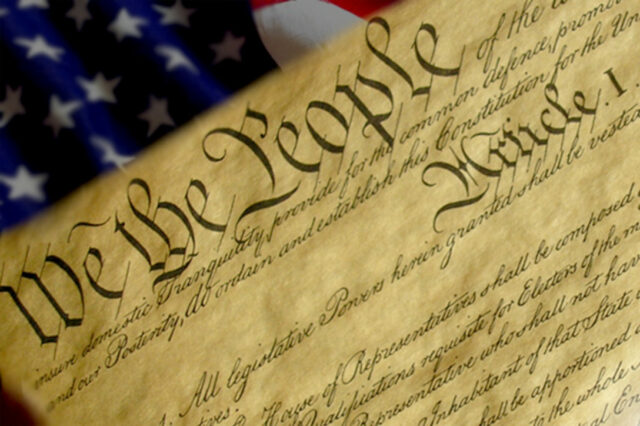
Learn the meaning of the Constitution and the principles of American government in this new version of Hillsdale’s most popular course. Continue reading


Learn the meaning of the Constitution and the principles of American government in this new version of Hillsdale’s most popular course. Continue reading
An address given by Willkie at the 44th Congress of American Industry on December 8th, 1939
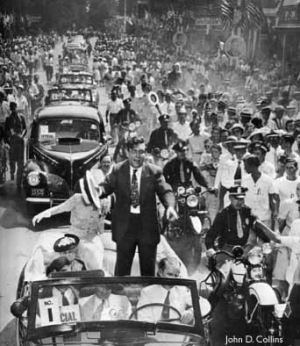
Willkie on the Campaign Trail
The history of government is the history of two conflicting principles: one is the supreme importance of the State; the other is the supreme importance of the individual. Either the people have believed that the State was merely the voluntary creation of individual citizens, responsible to them and designed primarily to protect their liberties; or else they have believed that the State was an authority in its own right to which individual citizens were subject and which could demand of them the suppression of their own desires and talents. The individual versus the State – that is the theme which more than any other has determined the course of civilization. Continue reading
 Over twenty years ago now, my wife and I worked for a Christian home schooling program in Illinois. One day a public school teacher, from someplace in New York, called up and wanted information about the home schooling program we had. In talking to her I tried to ascertain why she was interested in home schooling, seeing that she was a public school teacher. After all these years, I still remember her answer. I never forgot it. She said something like “I work here every day. No way do I want my daughter going to school here.” I thought at the time – what a resounding vote of confidence for the public school system from one of its own. Folks, when even the public school teachers don’t want their kids “educated” in the system they work for, you know there is something wrong. Continue reading
Over twenty years ago now, my wife and I worked for a Christian home schooling program in Illinois. One day a public school teacher, from someplace in New York, called up and wanted information about the home schooling program we had. In talking to her I tried to ascertain why she was interested in home schooling, seeing that she was a public school teacher. After all these years, I still remember her answer. I never forgot it. She said something like “I work here every day. No way do I want my daughter going to school here.” I thought at the time – what a resounding vote of confidence for the public school system from one of its own. Folks, when even the public school teachers don’t want their kids “educated” in the system they work for, you know there is something wrong. Continue reading
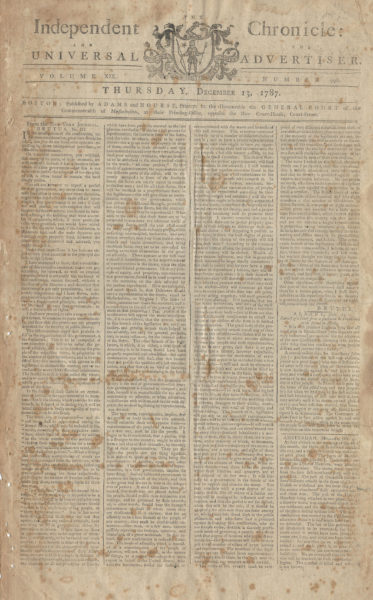 In contrast to Hamilton, Madison and Jay who supported ratification of the Constitution of the United States, many others did not. While the former’s works were more logically organized (and eventually won the debate), the Anti-federalist writers were nonetheless articulate. Serious questions were raised which eventually led to some of the Federalist writings that served as answers to allegations of the Anti-federalists.
In contrast to Hamilton, Madison and Jay who supported ratification of the Constitution of the United States, many others did not. While the former’s works were more logically organized (and eventually won the debate), the Anti-federalist writers were nonetheless articulate. Serious questions were raised which eventually led to some of the Federalist writings that served as answers to allegations of the Anti-federalists.
No serious student of the Constitution can be without both sides of the story. Some Anti-federalist prophecies have strangely come true. Writings by “Brutus” and “A Federal Farmer”, particularly relating to the “necessary and proper” clause (Article I, Section 8, Clause 18), view the future under an unrestrained Congress. Although the “necessary and proper” clause was never meant to be a blanket grant of power, over the years, as the intentions of the Founding Fathers have passed further and further from our memories, all three branches of the federal government have assumed powers that simply do not – and never did – exist. As the states have forgotten how to be a check against a Congress run amok, things are getting worse.
This document has been spell checked and proof-read it several times. Spelling and grammatical errors of the period in which these works were written, have for the most part been left intact. Undoubtedly, we may have missed a dropped character, hyphenation may be inadvertently missing, or other minor flaws may appear.
This work is considered public domain to the extent that the information is historic, and intended for non-commercial, informational purposes. In addition, our purposes in making this entire body of work available are several-fold: First, for the education of the American people so that we might better understand our nations history. Secondly, so that we might be able to use this information as a tool of reference as we contact our elected state and federal officials in order that we might right was has been terribly wronged in our great Republic.
These documents, like the Federalist Papers, themselves, cannot be considered all-inclusive. Many other pro and con pieces appeared in newspapers, in the state ratification conventions, in pamphlets, books, and other sources of the time. But these are considered the premier Anti-federalist writings organized somewhat to coincide with the Federalist Papers.
You will note below, that we have also separately posted the works of one ‘Centinel’ out the works of to focus on for reasons that will become important to this project.

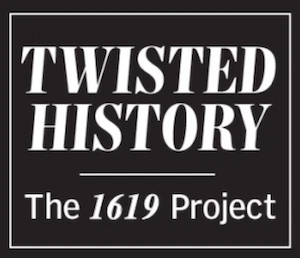 Not all black folks have bought into the lie that America was founded only on the institution of slavery. This lie is basically what the 1619 Project tries to portray as the foundation of America.
Not all black folks have bought into the lie that America was founded only on the institution of slavery. This lie is basically what the 1619 Project tries to portray as the foundation of America.
But Mychal Massie, writing on May 2nd gives the lie to Nikole Hannah-Jones now infamous 1619 Project, which, though wildly inaccurate, is now taught in many public schools as “history.” Mr. Massie is black. Continue reading
 Literally for decades now I have watched Christians bend over backwards to defend public education and subtly denigrate those among their brethren that dare to pass up the very questionable “benefits” of public schooling and educate their children in a Christian way, either via A Christian school or home schooling.
Literally for decades now I have watched Christians bend over backwards to defend public education and subtly denigrate those among their brethren that dare to pass up the very questionable “benefits” of public schooling and educate their children in a Christian way, either via A Christian school or home schooling.
Those who have taken the trouble to so some reading and research, (and there are not nearly enough of them), have discovered that public education in this country has been in the business of trying to blunt and dilute the influence of the Christian faith here literally since day one. Continue reading
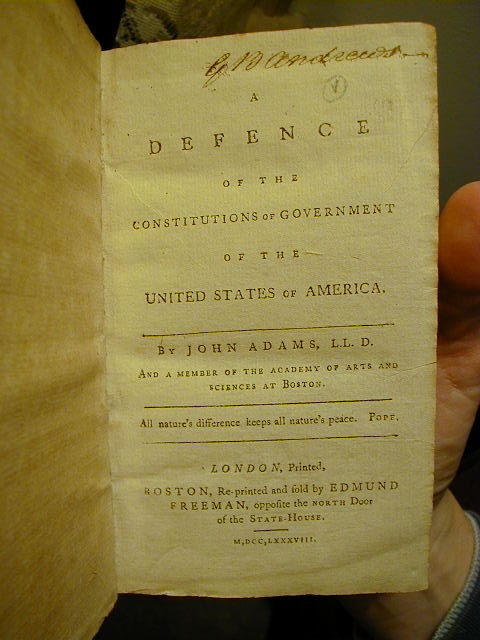
A Defense of the Constitutions of Government of the United States of America is a three volume work by John Adams published in 1787–1788. The work was written while Adams was serving as the American ambassador in London. In Britain and in previous postings in France and the Netherlands Adams had confronted several criticisms of the government systems used by the American states. Adams started the work prior to the writing of the Constitution of the United States and the work is not a defense of that document, but rather of the various state constitutions that were in place in 1787. Continue reading
From Patriot to pariah, the Franco dereliction and demise of a graveless Revolutionary War Founder.
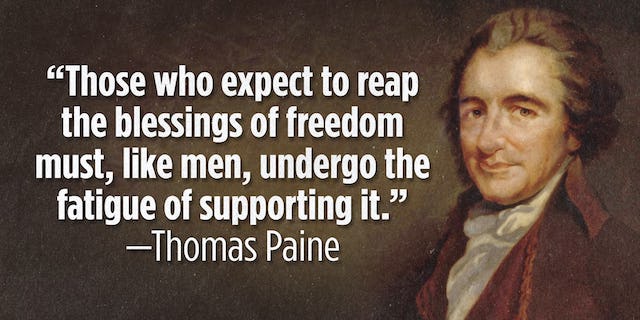 “But where says some is the king of America? I’ll tell you Friend, he reigns above…” ~ Thomas Paine (1776)
“But where says some is the king of America? I’ll tell you Friend, he reigns above…” ~ Thomas Paine (1776)
This week, we observe Patriots’ Day, which commemorates the battles of Lexington and Concord — and the opening salvo of the American Revolution immortalized in Ralph Waldo Emerson’s “Concord Hymn” as “The Shot Heard Round the World.” The events of that day are a fitting and enduring case study of the consequences when a tyrannical government attempts to disarm the people. In 1775, tyranny was met with defiance and resulted in the dawn of American Liberty and the birth of a new nation.
While this day is always appropriate for studying the heroic figures of the day, it is also a good opportunity to consider the corruption, dereliction, and demise of one of the most influential advocates for independence ahead of the American Revolution and through its conclusion. This historical figure also reminds us of what can happen when one becomes intoxicated with power and detached from his love for Liberty and the unalienable Rights of Man. Continue reading
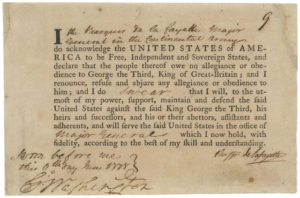 I, Peter Amiel, do acknowledge the thirteen United States of America, namely New Hampshire, Massachusetts-Bay, Rhode Island, Connecticutt, New York, New Jersey, Pennsylvania, Delaware, Maryland, Virginia, North Carolina, South Carolina and Georgia, to be free independant, and Sovereign States, and declare, that the People thereof owe no Allegiance or Obedience to George the Third King of Great Britain; and I renounce refuse and abjure any Allegiance, or Obedience to him. Continue reading
I, Peter Amiel, do acknowledge the thirteen United States of America, namely New Hampshire, Massachusetts-Bay, Rhode Island, Connecticutt, New York, New Jersey, Pennsylvania, Delaware, Maryland, Virginia, North Carolina, South Carolina and Georgia, to be free independant, and Sovereign States, and declare, that the People thereof owe no Allegiance or Obedience to George the Third King of Great Britain; and I renounce refuse and abjure any Allegiance, or Obedience to him. Continue reading
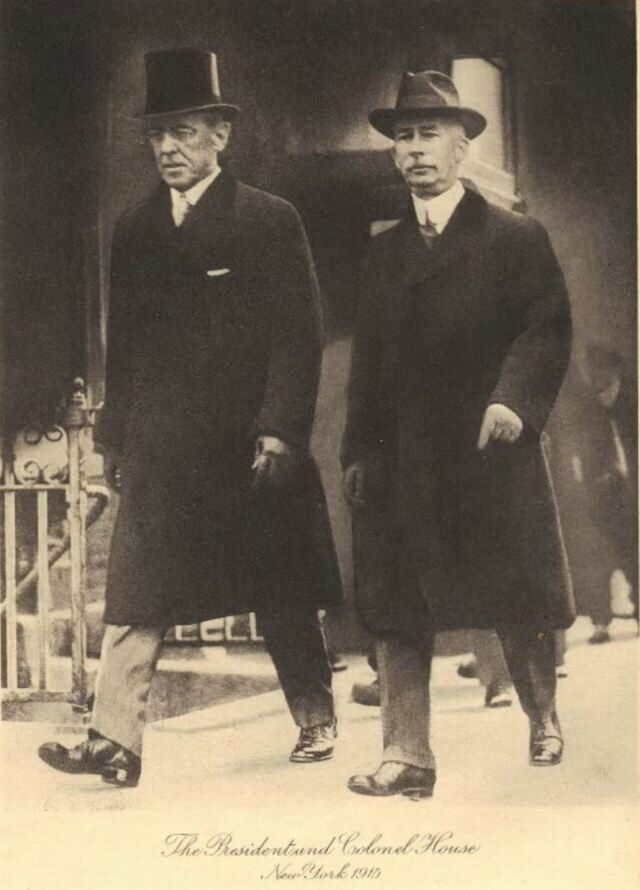
President Woodrow Wilson and Edward Mandell House
One of the worst stock market crashes and deepest recessions in our history occurred after WWI, starting during the last months of the Wilson Administration and extending into the Harding years. Harding’s Secretary of Commerce, Herbert Hoover, urged government sponsored construction and other projects, paying for them with financing provided by government bonds, meaning debt or expropriation of future earnings.
Harding disagreed & instead lowered taxes and decreased regulations. Voila, within 18 months, the recession had corrected.
Hoover was an engineer, by schooling, and was likely a technocrat. Harding died and was succeeded by Calvin Coolidge who set about paying off the national debt, that because of Democrat Wilson’s War to Make the World Safe for Democracy, had soared to a staggering $4 billion. By the time Coolidge left office, it was down to $2 billion. Continue reading
 During the latter half of the 1970s my family and I spent two years in Kanawha County, West Virginia during an event called the Kanawha County Textbook Protest. This protest started in 1974 when the county school board, with the exception of one courageous lady on it, Alice Moore, tried to foist off a set of textbooks on the children that was nothing more than unbridled humanist and leftist propaganda.
During the latter half of the 1970s my family and I spent two years in Kanawha County, West Virginia during an event called the Kanawha County Textbook Protest. This protest started in 1974 when the county school board, with the exception of one courageous lady on it, Alice Moore, tried to foist off a set of textbooks on the children that was nothing more than unbridled humanist and leftist propaganda.
The parents in the county rebelled against this. They kept their kids out of the public schools and they picketed those schools for the best part of a month. They created a furor that, at that time was heard all across the country and even in parts of Europe. The public school establishment from Washington on down finally managed to put a stop to it, but not before it had given them a black eye. Then they sought to portray the book protesters as nothing more than ignorant hillbillies. Does this sound familiar today? Continue reading
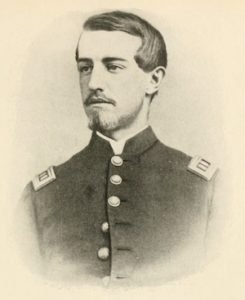 Any who have studied the history of the War Between the States aka the War of Northern Aggression have probably heard of the infamous Dahlgren Papers. The Dahlgren Papers were a set of orders found on the body of Colonel Ulric Dahlgren after he was killed in Judson (Kill-Cavalry) Kilpatrick’s bungled attempt at a raid on Richmond, Virginia in 1864. This was supposedly a raid to attempt to free federal prisoners of war. One writer said it was a “Moe, Larry, and Curly kind of caper.”
Any who have studied the history of the War Between the States aka the War of Northern Aggression have probably heard of the infamous Dahlgren Papers. The Dahlgren Papers were a set of orders found on the body of Colonel Ulric Dahlgren after he was killed in Judson (Kill-Cavalry) Kilpatrick’s bungled attempt at a raid on Richmond, Virginia in 1864. This was supposedly a raid to attempt to free federal prisoners of war. One writer said it was a “Moe, Larry, and Curly kind of caper.”
Whatever it was, Lincoln personally authorized it. The idea of a raid on the enemy’s capitol in wartime is not a particularly alarming one. Jubal Early tried it on Washington in 1864 and almost pulled it off. Had he a bigger force than he had he might have gotten away with it. However, Jubal Early did not have in his coat pocket a set of orders instructing him to murder Abraham Lincoln and his cabinet “on the spot.” Ulric Dahlgren had such a set of orders in his possession, and therein lies the Yankee dilemma (and worldview). Continue reading

Erasing History ~ Image: Lance Page
Today’s news is tomorrow’s history. By studying events through time, many historians in the past have noticed trends of patterns that tend to repeat. By taking note of these patterns we can better prepare for what is likely to happen in the future. Continue reading
 In going through books in my research library, some of which I am going to be forced to get rid of, due to severe space limitations in our new living situation, I came across a book I didn’t even remember. It was one written by James C. Hefley called “Textbooks on Trial” and it dealt primarily with the efforts of Mel and Norma Gabler to get decent textbooks approved for kids in Texas public schools way back in the 1960 and 70s. It was published in 1976, while the West Virginia Textbook Protest was still fresh in people’s minds and my family and I were still in West Virginia. I recall my wife and I hearing Norma Gabler speak at a God and Country rally back in the early 70s. Continue reading
In going through books in my research library, some of which I am going to be forced to get rid of, due to severe space limitations in our new living situation, I came across a book I didn’t even remember. It was one written by James C. Hefley called “Textbooks on Trial” and it dealt primarily with the efforts of Mel and Norma Gabler to get decent textbooks approved for kids in Texas public schools way back in the 1960 and 70s. It was published in 1976, while the West Virginia Textbook Protest was still fresh in people’s minds and my family and I were still in West Virginia. I recall my wife and I hearing Norma Gabler speak at a God and Country rally back in the early 70s. Continue reading

Engraved portrait of Edwin M. Stanton, Lincoln’s secretary of war
It would seem, from his commentary about others, that Lincoln’s Secretary of War, Edwin M. Stanton, had an inflated concept of his own abilities and a diminished view of the abilities of others. He was definitely not a practitioner of the Christian virtue of having a meek and humble spirit (James 4:6). He quite often spoke abusively of Lincoln and others in the administration. He referred to Lincoln at one point as “the original gorilla.” After becoming Secretary of War his disposition toward Lincoln did not improve. At one point he said to Judge Advocate General Joseph Holt, “Well, all I have to say is, we’ve got to get rid of that baboon at the White House!” Continue reading
Editor’s NOTE: It is rare that we publish a piece of this type, as it is in fact an advertisement for an upcoming auction – BUT – the links to various images are well worth looking at such pieces of history. ~ Ed.
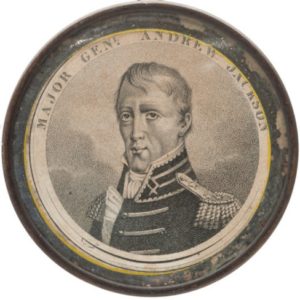
One of the lessons many of us learned at an early age from Thumper in the Disney movie “Bambi” was, “If you don’t have somethin’ nice to say, don’t say nuthin’ at all.” Andrew Jackson is a president for whom it becomes challenging to say nice things! On the one hand, to admirers, he appears as a quintessential symbol of American accomplishment, the ultimate individualist praised for his strength and audacity. On the other hand, to his detractors, he appears vengeful, self-obsessed, a combatant and a tyrant, described in terms, at least prior to Donald J. Trump, as “coming closest to an American Caesar” as any president we have encountered.
Some of Andrew Jackson’s most significant impacts on our history as a nation include: Continue reading
Le Bon and Goebbels teach us about modern State and NGO-sponsored Propaganda during COVID
 Knowledge of the theory and practical implementation of mass formation psychology can and is being used by propagandists, governments and the World Economic Forum to sway large groups of people to act for the benefit of the propagandists’ objectives. Although a major crisis of some sort can be extremely useful for propagandists to take advantage of (war, hyperinflation or public health for example), these psychological theories can and often are applied even without strong evidence of a compelling crisis. For this to be effective, the leader just has to be sufficiently compelling. Continue reading
Knowledge of the theory and practical implementation of mass formation psychology can and is being used by propagandists, governments and the World Economic Forum to sway large groups of people to act for the benefit of the propagandists’ objectives. Although a major crisis of some sort can be extremely useful for propagandists to take advantage of (war, hyperinflation or public health for example), these psychological theories can and often are applied even without strong evidence of a compelling crisis. For this to be effective, the leader just has to be sufficiently compelling. Continue reading
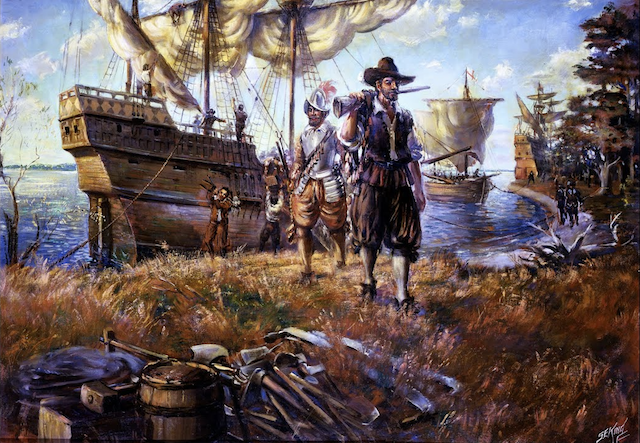
The first settlers arriving in Jamestown
This series explores the connections between America’s past and present. Learning more about the first Ukrainian American and his contributions to a foundational American story helps remind us that America has been profoundly transnational at every stage of its history. Continue reading

A stand in Dayton, Tennessee, during the July, 1925, Scopes trial. Photograph from Getty
In 1925, Lela V. Scopes, twenty-eight, was turned down for a job teaching mathematics at a high school in Paducah, Kentucky, her home town. She had taught in the Paducah schools before going to Lexington to finish college at the University of Kentucky. But that summer her younger brother, John T. Scopes, was set to be tried for the crime of teaching evolution in a high-school biology class in Dayton, Tennessee, in violation of state law, and Lela Scopes had refused to denounce either her kin or Charles Darwin. It didn’t matter that evolution doesn’t ordinarily come up in an algebra class. And it didn’t matter that Kentucky’s own anti-evolution law had been defeated. “Miss Scopes loses her post because she is in sympathy with her brother’s stand,” the Times reported. Continue reading
~ Prologue ~
One day in the House of Representatives, a bill was taken up appropriating money for the benefit of a widow of a distinguished naval officer. Several beautiful speeches had been made in its support. The Speaker was just about to put the question when Mr. Crockett arose:
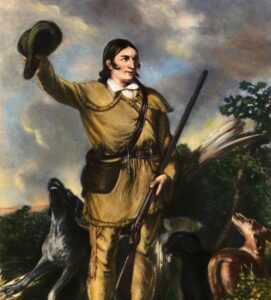 Mr. Speaker — I have as much respect for the memory of the deceased, and as much sympathy for the suffering of the living, if suffering there be, as any man in this house, but we must not permit our respect for the dead or our sympathy for a part of the living to lead us into an act of injustice to the balance of the living. I will not go into an argument to prove that Congress has no power to appropriate this money as an act of charity. Every member upon this floor knows it. We have the right, as individuals, to give away as much of our own money as we please in charity; but as members of Congress we have no right so to appropriate a dollar of the public money. Some eloquent appeals have been made to us upon the ground that it is a debt due the deceased. Mr. Speaker, the deceased lived long after the close of the war; he was in office to the day of his death, and I have never heard that the government was in arrears to him.
Mr. Speaker — I have as much respect for the memory of the deceased, and as much sympathy for the suffering of the living, if suffering there be, as any man in this house, but we must not permit our respect for the dead or our sympathy for a part of the living to lead us into an act of injustice to the balance of the living. I will not go into an argument to prove that Congress has no power to appropriate this money as an act of charity. Every member upon this floor knows it. We have the right, as individuals, to give away as much of our own money as we please in charity; but as members of Congress we have no right so to appropriate a dollar of the public money. Some eloquent appeals have been made to us upon the ground that it is a debt due the deceased. Mr. Speaker, the deceased lived long after the close of the war; he was in office to the day of his death, and I have never heard that the government was in arrears to him.
Continue reading